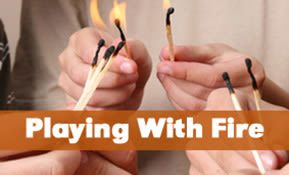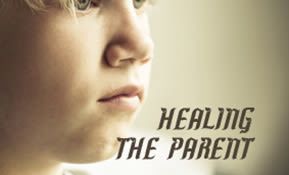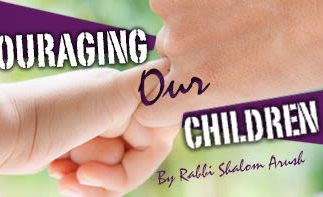
The Bermuda Triangle
What should a young married lady do if her mother constantly wants to come to her house, go shopping with her or even tag along with her when she's with her girlfriends?

Have you ever felt that you wanted to be close to someone and to be distant from that person at the same time? Let’s say that you’ve always wanted more love from your mother and you still want her love and approval even though you know that you’re not going to get it – at least not the way that you’ve dreamed of getting it all of your life. What should you do? On one hand the Torah tells you that you’re other hand the Torah tells you that you must be very careful to guard your own health.
So what if, to make matters worse, every time this mother is with her daughter she either belittles her or makes her feel depressed by talking about herself and all of her problems and what a terrible life she has. The answer in this situation is clearly that the daughter’s health must come before her obligations to her mother. It’s no mitzvah (commandment from the Torah) for her to sink into depression, even if the source of the depression is one of her parents.
I was speaking to a young man who was sinking into depression because he was caught between his warring parents. It’s called being in the deadly “Bermuda triangle.” His parents would triangulate him by literally fighting though him. Each parent would tell him bad things about the other one until he couldn’t take it anymore. He was caught in the classic double-bind situation. If he agreed with his mother he was  being disloyal to his father and if he agreed with or even listened to his father’s pain, then his mother would feel betrayed and rage at him. The only choice was for this boy was to remove himself from the double-bind by moving out of his house and coming to yeshiva in Jerusalem, which is what he’s done. When he came by my office recently for a visit, I could barely recognize him. His smile…his happy laughter…he’s found himself in Israel – he’s a new person! Out of respect, he still speaks to his mother, but just for a few minutes a week. He calls her every Friday afternoon just a few minutes before the onset of Shabbat. It’s just enough time to wish mom a good Shabbat and not enough time for her to trash him his father and everyone else in her life.
being disloyal to his father and if he agreed with or even listened to his father’s pain, then his mother would feel betrayed and rage at him. The only choice was for this boy was to remove himself from the double-bind by moving out of his house and coming to yeshiva in Jerusalem, which is what he’s done. When he came by my office recently for a visit, I could barely recognize him. His smile…his happy laughter…he’s found himself in Israel – he’s a new person! Out of respect, he still speaks to his mother, but just for a few minutes a week. He calls her every Friday afternoon just a few minutes before the onset of Shabbat. It’s just enough time to wish mom a good Shabbat and not enough time for her to trash him his father and everyone else in her life.
A young lady told me that her mother was making her crazy in a similar way. If she asked her mother for some privacy in order to do her shopping alone, or that she wanted to spend some time alone with her friend, her mother would blow up and accuse her of not loving her. “My life isn’t worth living if my own children desert me…isn’t it enough that your father doesn’t care about me?
This mother had put her parasitic claws into every one of her children and they all avoided her like the plague except for this daughter. If something wasn’t done about it soon, the daughter was in danger of losing her marriage and very possibly of losing herself.
I told her that her mother was toxic for her and that she had no choice but to take a break from her for a while. Of course at first she was reluctant. The yetzer hara (the evil inclination) told her, “you see, your mother is right…you are abandoning her when she needs you the most. This is proof that you’re a terrible daughter…how could you even think of not speaking with your mother!” On the other hand the yetzer tov (the healthy good inclination) was starting to kick in so I joined with it and said: “This advice might help your mother too. Once the symbiotic cord to you has been severed, she too will have a chance at a normal life. Appropriate emotional separation between the two of you might help your mother to wake up and notice that G-d gave her a husband too, a man of her own, who thank G-d still hasn’t given up on being married. She may also find herself making some of her own friends who don’t have any connection to you. Wouldn’t that be nice?”
As she began to strengthen I continued to join forces with the yetza tov by telling her more of the truth about her and her situation. I told her that what was most striking to me about her was just how “normal” she appears despite the obvious limitations of her mother who was her primary care-giver. I honestly told her that I was incredulous, that in my experience people with her background just don’t turn out like her! I wondered to myself how G-d had helped this woman to come out of such a family virtually unscathed (aside from this separation issue with her mother). Clearly she was underestimating her own strength and her own capacity for independence. So I asked her to look more closely at her accomplishments. Despite the fact that she had grown up in such a dysfunctional home, she had excelled in school, was popular amongst her peers, was well-liked by others, she puts herself and her household together with lots of style and she has succeeded in the world of work. I told her that this “problem” had outlived itself because the “little girl” inside of her was still looking for love that she didn’t need from her mother and which she could start getting from herself her husband and from G-d. This triggered an amazing memory that she told me on the spot and which she is happy to share with you…
It happened when she was 8 years old. That was when she was diagnosed with cancer and the doctors had given her parents very little hope that she would survive it. I asked her how she was able to overcome such a huge challenge when she was still so young and living in an environment where she had so little support? She was silent and introspective. Then she told me something that every one of us can learn from. She remembered that she actually did receive love at that time in her life. In fact, she remembered that she had received a great deal of love and attention from many people when she was in the hospital. As she continued, she recalled more and more of the positive attention that she received from friends, neighbors, teachers and relatives. She even remembered some isolated times that her mother acted in a selfless way toward her. When she was finished reviewing her memories she concluded by saying: “I guess the year that I had cancer, was the best year of my life!”
Now we both knew why she was as “normal” and as able to do things as she was. And now she knew that she had the strength to separate from her mother and that both she and her mother would live through it. It was because G-d had perfectly arranged for her to be loaded up with enough nurturing and love for a solid year of her life. The “best year of her life” and the One who gave it to her had given her the strength she needed to develop “normally” despite her difficult family circumstances. So too now she could rely on the residual internal resources from “best year of her life” to finally stake out her adult autonomy and emotional independence from her mother. This would also give her the strength to let her own children separate from her when the time came.
Following this “awakening” of her spirit, she calmly spoke with her mother and set appropriate limits with her. She was surprised that her mother took it pretty well. She reassured her mother that she loved her and that the separation was a temporary measure that she needed for her own health at this time. She also lovingly encouraged her mother to go for help which as yet her mother has refused.










8/31/2015
Beautiful!
8/31/2015